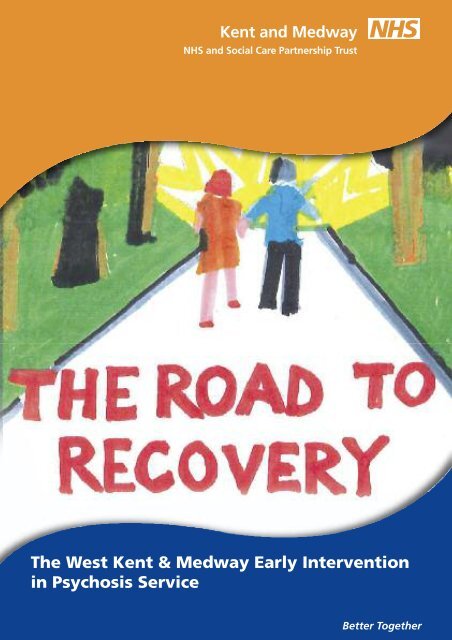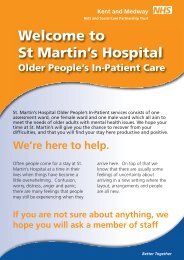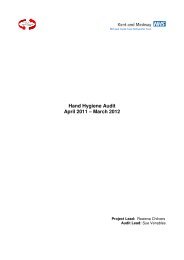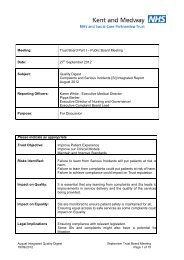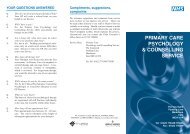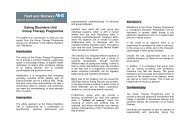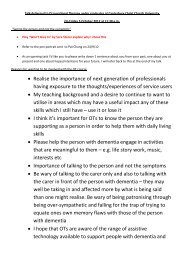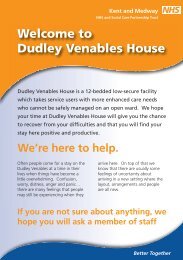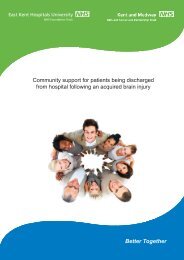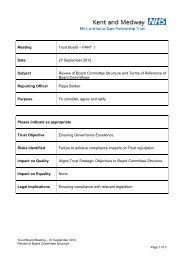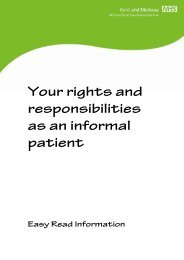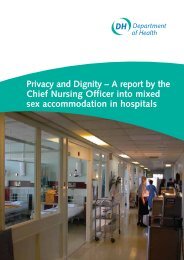The West Kent & Medway Early Intervention in Psychosis Service
The West Kent & Medway Early Intervention in Psychosis Service
The West Kent & Medway Early Intervention in Psychosis Service
Create successful ePaper yourself
Turn your PDF publications into a flip-book with our unique Google optimized e-Paper software.
<strong>Kent</strong> and <strong>Medway</strong><br />
NHS and Social Care Partnership Trust<br />
<strong>The</strong> <strong>West</strong> <strong>Kent</strong> & <strong>Medway</strong> <strong>Early</strong> <strong>Intervention</strong><br />
<strong>in</strong> <strong>Psychosis</strong> <strong>Service</strong><br />
Better Together
Notes<br />
___________________________________________________________________<br />
___________________________________________________________________<br />
___________________________________________________________________<br />
___________________________________________________________________<br />
___________________________________________________________________<br />
___________________________________________________________________<br />
___________________________________________________________________<br />
___________________________________________________________________<br />
___________________________________________________________________<br />
___________________________________________________________________<br />
___________________________________________________________________<br />
___________________________________________________________________<br />
___________________________________________________________________<br />
___________________________________________________________________<br />
___________________________________________________________________<br />
___________________________________________________________________<br />
___________________________________________________________________<br />
___________________________________________________________________<br />
___________________________________________________________________<br />
___________________________________________________________________<br />
___________________________________________________________________<br />
___________________________________________________________________<br />
___________________________________________________________________<br />
___________________________________________________________________<br />
___________________________________________________________________<br />
___________________________________________________________________<br />
___________________________________________________________________<br />
___________________________________________________________________<br />
___________________________________________________________________<br />
___________________________________________________________________<br />
___________________________________________________________________<br />
___________________________________________________________________<br />
___________________________________________________________________<br />
___________________________________________________________________<br />
2
What is psychosis<br />
‘<strong>Psychosis</strong>’ is the term used to cover a number of experiences, <strong>in</strong>clud<strong>in</strong>g<br />
hear<strong>in</strong>g “voices”, hav<strong>in</strong>g unusual or frighten<strong>in</strong>g ideas, and a loss of energy or<br />
drive. <strong>Psychosis</strong> can produce a change <strong>in</strong> th<strong>in</strong>k<strong>in</strong>g (e.g. jumbled thoughts),<br />
feel<strong>in</strong>gs (e.g. feel<strong>in</strong>g low or lack<strong>in</strong>g emotion) and behaviour (e.g. isolat<strong>in</strong>g<br />
yourself). It is most common for these problems to beg<strong>in</strong> <strong>in</strong> people aged<br />
between 14 and 65 years. It is not uncommon and approximately four out of<br />
every 100 people will experience a psychotic episode at some time <strong>in</strong> their<br />
lives. <strong>The</strong>re is much that can be done to help, and most people make a full<br />
recovery.<br />
What causes psychosis<br />
Some people have a greater risk of develop<strong>in</strong>g psychosis. <strong>The</strong>re may be a<br />
biological/genetic connection, i.e. hav<strong>in</strong>g a family member who has<br />
experienced psychosis can <strong>in</strong>crease risk. However, many people who develop<br />
psychosis have no history of psychosis <strong>in</strong> their immediate family. <strong>The</strong>re are also<br />
social and environmental factors that may <strong>in</strong>crease risk, such as extreme<br />
exposure to stress, illicit drug use (e.g. cannabis), abuse (i.e. physical, emotional<br />
or sexual) and trauma. In other words there are a number of factors that may<br />
make someone more vulnerable to develop psychotic problems. This is<br />
referred to as the ‘stress-vulnerability model’.<br />
<strong>Psychosis</strong> rema<strong>in</strong>s a complex condition that is not fully understood (for example,<br />
we still do not know why some people develop psychosis and others don’t). It is<br />
an illness that cont<strong>in</strong>ues to be the focus of extensive research. <strong>The</strong> cause and<br />
outcome of psychosis varies from person to person. <strong>The</strong> way we cope with<br />
unusual experiences and how they affect us will <strong>in</strong>fluence the outcome.<br />
3
Effects of psychosis<br />
<strong>Psychosis</strong> can <strong>in</strong>fluence the follow<strong>in</strong>g:<br />
Cognition – thought processes, ideas and memories, e.g. rac<strong>in</strong>g thoughts,<br />
<strong>in</strong>trusive thoughts, problems with th<strong>in</strong>k<strong>in</strong>g<br />
Feel<strong>in</strong>gs – mood changes, depression, anxiety, elation, paranoia, feel<strong>in</strong>g<br />
isolated and detached<br />
Behaviour – unusual behaviour, or loss of <strong>in</strong>terest and motivation;<br />
Perception – possible difficulties <strong>in</strong> understand<strong>in</strong>g and <strong>in</strong>terpret<strong>in</strong>g reality,<br />
e.g. beliefs that have no clear basis<br />
Personality – sense of self and identity, e.g. loss of identity<br />
Myths and misconceptions<br />
<strong>Psychosis</strong> is not…<br />
• About hav<strong>in</strong>g a split personality (i.e. Dr. Jekyll & Mr. Hyde)<br />
• A condition that only affects certa<strong>in</strong> types of <strong>in</strong>dividuals. In theory,<br />
anyone – male or female, regardless of ethnicity – can develop<br />
psychosis<br />
• Always easy to spot. <strong>The</strong> early stages of psychosis are often confused<br />
with other difficulties that many young people experience as part of<br />
adolescence and grow<strong>in</strong>g up<br />
• Always l<strong>in</strong>ked to aggressive or violent behaviour<br />
One th<strong>in</strong>g that can make it particularly difficult to come to terms with hav<strong>in</strong>g<br />
psychosis is the stigma attached to mental health problems. Misunderstand<strong>in</strong>g<br />
can lead to fear and discrim<strong>in</strong>ation. It is not surpris<strong>in</strong>g that people who<br />
experience psychosis often feel they are “different” or “don’t fit <strong>in</strong>”, and that<br />
they are not valued or respected. This <strong>in</strong> turn can lead to social withdrawal<br />
and can become the most disabl<strong>in</strong>g feature of psychosis.<br />
<strong>The</strong> <strong>Early</strong> <strong>Intervention</strong> Team can play a pivotal part <strong>in</strong> reduc<strong>in</strong>g stigma by<br />
educat<strong>in</strong>g clients, families and friends, <strong>in</strong> addition to schools, colleges and GP<br />
surgeries, about psychosis and about recovery.<br />
4
Symptoms may <strong>in</strong>clude…<br />
Delusions – strongly held beliefs that are unusual or bizarre <strong>in</strong> nature. Quite<br />
often beliefs are about be<strong>in</strong>g persecuted.<br />
Halluc<strong>in</strong>ations – unusual sensory perceptions <strong>in</strong> the absence of an external<br />
stimulus, e.g. hear<strong>in</strong>g voices when people are not around, see<strong>in</strong>g th<strong>in</strong>gs that<br />
are not there, hav<strong>in</strong>g disordered smell, touch or taste.<br />
Thought disorder – hav<strong>in</strong>g trouble l<strong>in</strong>k<strong>in</strong>g thoughts together, thought<br />
broadcast<strong>in</strong>g (e.g. “people can hear my thoughts”), thought <strong>in</strong>sertion (e.g.<br />
“people are putt<strong>in</strong>g thoughts <strong>in</strong>to my head”), flight of ideas (e.g. jump<strong>in</strong>g<br />
from one topic to another).<br />
Disordered speech – speech may be rapid and <strong>in</strong>coherent. <strong>The</strong>re may be an<br />
<strong>in</strong>ability to make conversation.<br />
<strong>The</strong>se symptoms are referred to as positive symptoms, which are often<br />
present <strong>in</strong> the acute/active phase of psychosis.<br />
People experienc<strong>in</strong>g psychosis can also have negative symptoms which<br />
<strong>in</strong>clude the follow<strong>in</strong>g:-<br />
Social withdrawal – avoid<strong>in</strong>g family, friends and social gather<strong>in</strong>gs, stay<strong>in</strong>g <strong>in</strong><br />
bed or isolat<strong>in</strong>g oneself<br />
Loss of motivation – lack of energy and drive to pursue activities, loss of the<br />
persons usual experiences or behaviour<br />
Loss of feel<strong>in</strong>gs for others – blunt<strong>in</strong>g of emotions and not feel<strong>in</strong>g anyth<strong>in</strong>g<br />
Depression – Low mood that affects an <strong>in</strong>dividual’s social function<strong>in</strong>g and/or<br />
activities of daily liv<strong>in</strong>g<br />
Loss of sense of pleasure – <strong>in</strong>ability to experience pleasure <strong>in</strong> people, events<br />
and objects<br />
Self-neglect – poor self care and dietary <strong>in</strong>take<br />
This list does not <strong>in</strong>clude everyth<strong>in</strong>g – people can also experience other<br />
strange or peculiar feel<strong>in</strong>gs that are not mentioned here.<br />
5
Different forms of psychosis<br />
Drug-<strong>in</strong>duced psychosis – An episode of psychosis can be triggered by tak<strong>in</strong>g<br />
drugs (e.g. cannabis) or alcohol. <strong>The</strong>se symptoms may disappear as the<br />
substance wears off, but sometimes withdraw<strong>in</strong>g from drugs and alcohol can<br />
cause psychotic symptoms.<br />
Brief reactive psychosis – Psychotic symptoms may arise suddenly <strong>in</strong> response<br />
to a major stress <strong>in</strong> someone's life, such as a death <strong>in</strong> the family, a relationship<br />
break-up, start<strong>in</strong>g work or follow<strong>in</strong>g an important change of circumstances.<br />
Schizophrenia – This is the most common form of psychosis. ‘Schizophrenia’<br />
refers to an illness <strong>in</strong> which the changes of behaviour or symptoms have been<br />
present for a period of at least six months. Symptoms, severity and length of<br />
illness vary from person to person.<br />
Bipolar disorder – Also known as ‘manic depression’. This is a mood disorder<br />
characterized by extreme highs (mania) and lows (depression). Psychotic<br />
symptoms can appear as part of a more general disturbance <strong>in</strong> mood, but not<br />
everyone who has bipolar disorder experiences psychotic symptoms.<br />
Excitement and happ<strong>in</strong>ess can be associated with grandiose beliefs.<br />
Depression can be associated with hostile and critical auditory halluc<strong>in</strong>ations.<br />
<strong>The</strong>re are periods between these phases when someone is well and lead<strong>in</strong>g a<br />
productive, fill<strong>in</strong>g life. Some famous people such as Stephen Fry and Paul<br />
Merton have had this form of psychosis.<br />
Schizoaffective disorder – This diagnosis is made when the cl<strong>in</strong>ical picture is<br />
not 'typical' of either a mood disorder or schizophrenia, but the person has<br />
concurrent or consecutive symptoms of both illnesses.<br />
Psychotic depression – This is also a mood disorder, characterized by severe<br />
cl<strong>in</strong>ical depression with psychotic symptoms, but without periods of mania.<br />
Organic psychosis – Psychotic symptoms may appear to be due to a head <strong>in</strong>jury<br />
or a physical illness that disrupts the bra<strong>in</strong> function<strong>in</strong>g, such as encephalitis,<br />
AIDS or a tumour. <strong>The</strong>re are usually other symptoms present, such as memory<br />
problems or confusion. EIS is not suitable for people with psychotic symptoms<br />
which arise from bra<strong>in</strong> damage and organic bra<strong>in</strong> disorder, <strong>in</strong>clud<strong>in</strong>g<br />
dementia.<br />
All of the above depend on the pattern of symptoms and difficulties<br />
experienced at that time. As symptoms may not rema<strong>in</strong> the same, a different<br />
diagnosis could be given at different stages. <strong>The</strong>refore, most health<br />
professionals prefer to th<strong>in</strong>k <strong>in</strong> terms of a range of psychotic symptoms.<br />
6
<strong>The</strong> role of your care co-ord<strong>in</strong>ator<br />
Every client referred to the <strong>Early</strong> <strong>Intervention</strong> Team is allocated a Care Coord<strong>in</strong>ator.<br />
He or she will be a qualified mental health practitioner. Please ask<br />
to speak to her or him regard<strong>in</strong>g any questions you may have. A Care Coord<strong>in</strong>ator<br />
is there to meet regularly with clients and their families, to go<br />
through care plans and discuss treatment and care. He or she will also<br />
organise a care programme approach (CPA) meet<strong>in</strong>g where the care plan will<br />
be reviewed.<br />
Treatments<br />
Treatment for psychosis typically <strong>in</strong>volves both medication and other<br />
therapeutic elements.<br />
Medication<br />
<strong>The</strong> most common medication used to treat psychosis is a group of drugs<br />
called atypical anti-psychotics also called neuroleptics. It is not possible to<br />
know <strong>in</strong> advance which medication will suit or work best with someone and<br />
therefore many medication adjustments may be required. <strong>The</strong> frequency and<br />
quantity varies accord<strong>in</strong>g to the type of medication prescribed. Don’t be afraid<br />
to ask questions about medication.<br />
Anti-psychotic medication can be taken <strong>in</strong> one of two ways: by tablet or<br />
<strong>in</strong>jection. Both are designed to help reduce symptoms and prevent them from<br />
return<strong>in</strong>g. Injections are often better for people who don’t like tablets or who<br />
sometimes forget to take them – they give a slow release of medication and<br />
are sometimes called “depots”. Anti-psychotic medication is designed to help<br />
people with psychosis <strong>in</strong> two ways: to reduce psychotic symptoms and to<br />
prevent those symptoms return<strong>in</strong>g.<br />
7
Types of medication - tablet form (British National Formulary 2001):<br />
NB: <strong>The</strong> figures given are accord<strong>in</strong>g to ‘therapeutic range’ – doses will vary<br />
depend<strong>in</strong>g on the <strong>in</strong>dividual.<br />
Generic Name Commercial Name Dose<br />
Amisulpride (Solian) 400-800mg<br />
Clozap<strong>in</strong>e (Clozaril) 200-900mg<br />
Haloperidol (Serence) 1.5-30mg<br />
Olanzap<strong>in</strong>e (Zyprexa) 5-20mg<br />
Quetiap<strong>in</strong>e (Seroquel) 300-750mg<br />
Risperidone (Risperidal) 2-8mg<br />
Aripiprazole (Abilify) 5-30mg<br />
Injection form:<br />
Generic Name<br />
Fluphenaz<strong>in</strong>e Decanoate<br />
Flupenthixol Decanoate<br />
Risperidone<br />
Commercial<br />
(Modecate)<br />
(Depixol)<br />
(Risperdal Consta)<br />
Possible side effects of medication:<br />
Common side effects <strong>in</strong>clude dry mouth, nausea, drows<strong>in</strong>ess, stiffness, or<br />
restlessness. <strong>The</strong> newer generation of medications are generally much better<br />
tolerated. However, if side effects are noticed it is important to <strong>in</strong>form your<br />
care co-ord<strong>in</strong>ator or doctor. Some people will get side effects with one<br />
medication or dose but not with another. Work<strong>in</strong>g out which medication<br />
and dose suits you is someth<strong>in</strong>g that can be achieved between you and<br />
your doctor.<br />
Frequency of tak<strong>in</strong>g medication<br />
Medication taken <strong>in</strong> tablet form is usually taken daily. How many times a day<br />
will depend on the drug prescribed and the recommended dosage. Different<br />
anti psychotics are associated with different dosages and different doses suit<br />
different people. Dosages are also often determ<strong>in</strong>ed by the type and number<br />
of symptoms a person has and how much distress they are caus<strong>in</strong>g. This is<br />
8
often related to the stage of the psychosis. When psychotic symptoms are at<br />
their strongest and most severe (often referred to as the acute stage) higher<br />
quantities of the drug are needed to br<strong>in</strong>g the symptoms under control.<br />
However, when someone is <strong>in</strong> the recovery stage and symptoms are not as<br />
distress<strong>in</strong>g or have gone altogether the dosage can be lowered.<br />
Medication given <strong>in</strong> <strong>in</strong>jection form is usually adm<strong>in</strong>istered by a nurse. Aga<strong>in</strong>,<br />
the frequency of <strong>in</strong>jections depends on the <strong>in</strong>dividual and varies from person<br />
to person. Some people have one <strong>in</strong>jection once a week but some people<br />
have an <strong>in</strong>jection every two weeks or once a month.<br />
<strong>The</strong> length of time tak<strong>in</strong>g medication<br />
This also varies from <strong>in</strong>dividual to <strong>in</strong>dividual and how long symptoms persist. It<br />
is recommended that after a first episode of psychosis anti psychotic<br />
medication should be taken for two years. However, this can <strong>in</strong>crease to five<br />
years <strong>in</strong> the event of relapse.<br />
Other treatments<br />
Individual psychological treatments<br />
Cognitive Behavioural <strong>The</strong>rapy (CBT) has been proven to be effective <strong>in</strong><br />
reduc<strong>in</strong>g positive symptoms and distress. CBT looks at the relationship<br />
between thoughts, feel<strong>in</strong>gs and behaviour, and provides people with<br />
strategies to manage their symptoms and make sense of their experiences.<br />
Some other therapy approaches (e.g., Solution-Focused) may also be useful <strong>in</strong><br />
some cases.<br />
Family <strong>Intervention</strong>s<br />
Behavioural Family <strong>The</strong>rapy (BFT) <strong>in</strong>volves members of a family, <strong>in</strong>clud<strong>in</strong>g the<br />
client, be<strong>in</strong>g seen together for approximately 10 sessions. It primarily aims to<br />
reduce stress, assist <strong>in</strong> solv<strong>in</strong>g current problems and to help understand one<br />
another. Another approach that some families f<strong>in</strong>d helpful is Systemic<br />
<strong>The</strong>rapy.<br />
9
Occupational therapy (OT)<br />
Occupational <strong>The</strong>rapy is used to help with activities of daily liv<strong>in</strong>g such as<br />
shopp<strong>in</strong>g, cook<strong>in</strong>g, or learn<strong>in</strong>g new skills to assist <strong>in</strong> work<strong>in</strong>g towards paid<br />
employment or voluntary work.<br />
Group therapy<br />
Groups can be particularly helpful to counter the sense of aloneness that many<br />
clients feel. EIS offers a range of groups, <strong>in</strong>clud<strong>in</strong>g: Activity-Focused Groups<br />
(e.g., the walk<strong>in</strong>g group; the sport<strong>in</strong>g recovery group); Support Groups (e.g.,<br />
the Clients’ Support Group, or the Carers’ Group), and Social Groups.<br />
Complementary therapies<br />
Art, drama, music, meditation, relaxation, sport<strong>in</strong>g activity and exercise,<br />
acupuncture, aromatherapy and reflexology can all help to reduce anxiety and<br />
stress and improve physical well be<strong>in</strong>g.<br />
Dr<strong>in</strong>k<strong>in</strong>g alcohol and tak<strong>in</strong>g drugs when prescribed antipsychotic<br />
medication<br />
Alcohol<br />
Alcohol comb<strong>in</strong>ed with anti-psychotic medication can <strong>in</strong>crease levels of<br />
sedation or drows<strong>in</strong>ess. Moderate use of alcohol doesn’t seem to trigger<br />
psychotic symptoms. Try to dr<strong>in</strong>k no more than the healthy daily alcohol limit:-<br />
Men – 4 units<br />
Women – 2 or 3 units<br />
One unit = ½ p<strong>in</strong>t of lager, 1 small glass of w<strong>in</strong>e, 1 shot of spirits<br />
It is advised that you seek advice before driv<strong>in</strong>g on anti-psychotic medication.<br />
ALWAYS AVOID BINGE DRINKING<br />
Medication bought over the counter<br />
It is generally safe to take pa<strong>in</strong>killers, paracetamol, aspir<strong>in</strong> etc…when tak<strong>in</strong>g<br />
anti-psychotic medication but please consult your doctor or care co-ord<strong>in</strong>ator.<br />
10
Illegal street drugs<br />
Cannabis, ecstasy and LSD can <strong>in</strong>crease the symptoms of psychosis and can<br />
also counteract the benefits of anti-psychotic medication.<br />
Always speak to your doctor, care co-ord<strong>in</strong>ator or chemist about all the drugs<br />
you are tak<strong>in</strong>g to be sure.<br />
Large amounts of nicot<strong>in</strong>e and /or coffee can also trigger symptoms of<br />
psychosis.<br />
Recovery from psychosis<br />
Recovery means different th<strong>in</strong>gs to different people. It is not always about the<br />
complete disappearance of mental distress and symptoms. For some, it means<br />
learn<strong>in</strong>g to cope with difficulties, ga<strong>in</strong><strong>in</strong>g control over ones life, achiev<strong>in</strong>g<br />
goals, develop<strong>in</strong>g skills and fulfill<strong>in</strong>g dreams.<br />
Recovery from the first episode usually takes a number of months. People<br />
with psychosis do recover, though if symptoms rema<strong>in</strong> or return, the recovery<br />
process may be prolonged. <strong>The</strong>y can learn to manage their symptoms and live<br />
<strong>in</strong>dependent, fulfilled lives <strong>in</strong> the community. <strong>The</strong> availability of family support<br />
and other support systems tend to be crucial for recovery.<br />
Recovery statistics<br />
With susta<strong>in</strong>ed treatment, over 80% of <strong>in</strong>dividuals achieve remission of<br />
symptoms from their 1st episode of psychosis with<strong>in</strong> six months. A m<strong>in</strong>ority,<br />
about 10%, need high levels of support and help for many years. Attention to<br />
early relapse prevention is vital as two-thirds of people will relapse with<strong>in</strong><br />
three years of first presentation, which can set a cycle of repeated relapse.<br />
However, between relapses they will rema<strong>in</strong> well and live a perfectly normal<br />
life. Comprehensive programmes to detect and treat early psychosis and to<br />
support young people with early psychosis promote recovery and<br />
<strong>in</strong>dependence and encourage uptake of social, educational and employment<br />
opportunities. Two years after diagnosis 90% of <strong>in</strong>dividuals report satisfaction<br />
11
with their employment, educational and social atta<strong>in</strong>ments, and less than 25%<br />
of days out of role are taken <strong>in</strong> the two years post diagnosis. <strong>The</strong> earlier<br />
psychosis is recognised, assessed and treated, the better the outlook!<br />
Stay<strong>in</strong>g well – learn<strong>in</strong>g to recognise signs of relapse<br />
Research suggests that relapse is common and more likely <strong>in</strong> the early years<br />
after a first episode, with one <strong>in</strong> two people hav<strong>in</strong>g a relapse with<strong>in</strong> two years.<br />
<strong>The</strong>refore it is important to be aware of the early warn<strong>in</strong>g signs that are often<br />
present before symptoms of psychosis emerge. <strong>The</strong>se signs may occur days or<br />
sometimes weeks before a psychotic episode. Be<strong>in</strong>g aware of early warn<strong>in</strong>g<br />
signs can help prevent relapse and can help you feel <strong>in</strong> control of your illness<br />
as opposed to the illness controll<strong>in</strong>g you!<br />
<strong>Early</strong> warn<strong>in</strong>g signs are usually <strong>in</strong>dividual to the person but there are often<br />
similarities. Some typical early warn<strong>in</strong>g signs <strong>in</strong>clude:<br />
• Feel<strong>in</strong>g more tense, afraid and anxious<br />
• Rac<strong>in</strong>g or jumbled thoughts<br />
• Restlessness, feel<strong>in</strong>g irritable<br />
• Feel<strong>in</strong>g confused<br />
• Poor appetite, weight loss<br />
• Memory difficulties and trouble concentrat<strong>in</strong>g<br />
• Sleep difficulties<br />
• Self neglect<br />
Your parents and your care co-ord<strong>in</strong>ator or another professional can help you<br />
identify your early warn<strong>in</strong>g signs. <strong>The</strong>y will help you complete a relapse<br />
prevention plan, by look<strong>in</strong>g back at your last episode and try<strong>in</strong>g to recall what<br />
the early signs were then.<br />
If you feel you may be relaps<strong>in</strong>g or experienc<strong>in</strong>g unusual experiences similar to<br />
your last episode try not to panic but don’t ignore them. Always talk to<br />
someone you can trust about it and tell your care co-ord<strong>in</strong>ator or someone<br />
from the team. Refer to your relapse plan and try to do what it suggests.<br />
12
A relapse prevention plan<br />
A relapse prevention plan is designed to establish how someone’s symptoms<br />
may build up over time. It identifies early warn<strong>in</strong>g signs and possible triggers<br />
to stress and also records important telephone numbers of people <strong>in</strong>volved <strong>in</strong><br />
your care (see example on page 15). <strong>The</strong> EIS team recommend that all clients<br />
have a plan to help them and their family/friends recognise signs of<br />
deterioration <strong>in</strong> mental health as it allows for some control over relapses and<br />
hopefully prevent them from happen<strong>in</strong>g. Furthermore, mak<strong>in</strong>g use of a<br />
relapse plan can often make relapses shorter and less disruptive. Be<strong>in</strong>g aware<br />
of symptoms and how to manage them is fundamental to the recovery<br />
process. If a relapse does occur it is important to stay positive and not to panic<br />
or th<strong>in</strong>k you are fail<strong>in</strong>g.<br />
As with all aspects of psychosis and recovery, a relapse plan is <strong>in</strong>dividual and<br />
unique to the person however it may be helpful to th<strong>in</strong>k about some typical<br />
early warn<strong>in</strong>g signs (i.e. feel<strong>in</strong>g more tense or anxious, restlessness, low <strong>in</strong><br />
mood, confused and withdrawn) and triggers of psychosis (i.e. Exams,<br />
work<strong>in</strong>g long hours, arguments with family or friends).<br />
A relapse plan may <strong>in</strong>clude a comb<strong>in</strong>ation of psychological and practical<br />
cop<strong>in</strong>g strategies as well as medical treatments. It will usually be completed as<br />
part of a care plan with your care co-ord<strong>in</strong>ator or another mental health<br />
professional. Some people f<strong>in</strong>d it helpful to have their relapse plan written on<br />
small cards to keep <strong>in</strong> their purse or wallet so they can refer to them at any<br />
time.<br />
What helps<br />
• Tak<strong>in</strong>g anti-psychotic medication on a regular basis if prescribed<br />
• Talk<strong>in</strong>g to people you trust about your worries<br />
• Be realistic! Goals should be reasonable and achievable<br />
• Support from family and friends<br />
• Participat<strong>in</strong>g <strong>in</strong> daily activities you enjoy<br />
• Some structure and rout<strong>in</strong>e to your day<br />
13
• Keep<strong>in</strong>g physically well. Recovery from psychosis is aided by a wellbalanced<br />
diet, adequate sleep and regular exercise<br />
• Hobbies and recreational activities that you enjoy and look forward to<br />
• Talk<strong>in</strong>g to others that have experienced psychosis (attend<strong>in</strong>g a support<br />
group may be helpful)<br />
• Try to give yourself time and space when you need it (“me time”)<br />
• Education about psychosis, try<strong>in</strong>g to understand your symptoms<br />
What doesn’t help<br />
• Keep<strong>in</strong>g th<strong>in</strong>gs to yourself and not talk<strong>in</strong>g about the th<strong>in</strong>gs that are<br />
troubl<strong>in</strong>g you<br />
• Avoid<strong>in</strong>g contact with others/isolat<strong>in</strong>g yourself<br />
• Excess alcohol consumption<br />
• Use of recreational drugs (i.e. cannabis, speed, LSD, coca<strong>in</strong>e)<br />
• Tak<strong>in</strong>g too much on/too much stress<br />
• Negative th<strong>in</strong>k<strong>in</strong>g<br />
An example of a relapse plan<br />
<strong>Early</strong> warn<strong>in</strong>g signs<br />
Th<strong>in</strong>k about changes <strong>in</strong> thoughts feel<strong>in</strong>gs and behaviour<br />
• Disturbed sleep pattern<br />
• Loss of motivation, feel<strong>in</strong>g depressed<br />
• Self-imposed isolation<br />
• Poor concentration<br />
• Self-neglect<br />
14
Triggers<br />
Th<strong>in</strong>k about your past experiences of becom<strong>in</strong>g unwell and th<strong>in</strong>gs that make<br />
you feel more stressed<br />
• Exams<br />
• Arguments with family and/or friends<br />
• Use/<strong>in</strong>creased use of alcohol/street drugs/prescribed medication<br />
• Pressure at work<br />
Th<strong>in</strong>gs that help when I feel stressed<br />
• Relaxation (hav<strong>in</strong>g a bath)<br />
• Talk<strong>in</strong>g to friends/family<br />
• Exercise/sports activities<br />
• Listen<strong>in</strong>g to music/watch<strong>in</strong>g a DVD<br />
Relapse drill<br />
Whenever I experience any of the early warn<strong>in</strong>g signs I will respond by:<br />
• Stay<strong>in</strong>g calm<br />
• Mak<strong>in</strong>g contact with my Care Co-ord<strong>in</strong>ator/EIS team/GP<br />
• Speak<strong>in</strong>g to a family member/friend<br />
• Mak<strong>in</strong>g an appo<strong>in</strong>tment for a medication review<br />
IMPORTANT CONTACT INFORMATION<br />
Care co-ord<strong>in</strong>ator:_________________________________________________<br />
Tel: _____________________________________________________________<br />
EIS 01634 854547<br />
GP: _____________________________________________________________<br />
Tel: _____________________________________________________________<br />
In the event of an emergency please contact your local accident and<br />
emergency department.<br />
15
Build<strong>in</strong>g confidence after a first episode of psychosis<br />
It is quite common that someone will lose confidence follow<strong>in</strong>g a first episode<br />
of psychosis. Understandably some people will feel uncerta<strong>in</strong> about the future<br />
and worry that the psychotic symptoms will return. Similarly, some people may<br />
avoid socialis<strong>in</strong>g or go<strong>in</strong>g out and will f<strong>in</strong>d it difficult to motivate themselves to<br />
go to work or school. With time and support from family, friends and<br />
professionals, feel<strong>in</strong>gs of anxiety and hopelessness will disappear. However, if<br />
these feel<strong>in</strong>gs become more <strong>in</strong>tense it is important that the person seeks<br />
professional help where they can and learn some cop<strong>in</strong>g techniques to cope<br />
with these feel<strong>in</strong>gs.<br />
<strong>The</strong>re are a number of th<strong>in</strong>gs that may help <strong>in</strong> <strong>in</strong>creas<strong>in</strong>g confidence. For<br />
example, talk<strong>in</strong>g to someone you trust about your feel<strong>in</strong>gs if you can. It helps<br />
to set goals but realistic goals, don’t try to run before you can walk! Try to do<br />
th<strong>in</strong>gs that mix pleasure with a sense of achievement (i.e. don’t just watch<br />
television – tidy up, go to the gym, and then watch television). It often takes a<br />
while to feel yourself aga<strong>in</strong>, so give it time.<br />
Some personal experiences<br />
From a parent’s po<strong>in</strong>t of view the knowledge that your child has a mental illness is one<br />
of the most frighten<strong>in</strong>g experiences my husband and I have experienced. So different<br />
from any physical illness that once diagnosed you know how to deal with, and roughly<br />
how long that illness would last. Adam experienced his first episode of psychosis 6<br />
months ago and we were lucky enough to be referred to the Beacon and the EIS team.<br />
<strong>The</strong> help and support we have received as a family has been a life saver. <strong>The</strong>re is always<br />
someone at the end of a phone, the regular visits from EIS, however many times a week<br />
is necessary, and weekly family meet<strong>in</strong>gs have been <strong>in</strong>valuable. We started attend<strong>in</strong>g<br />
the meet<strong>in</strong>gs of the Carers’ Support Group <strong>in</strong> Dover <strong>in</strong> July. We have found this to be a<br />
great way to share experiences with other parents and to talk freely with people who<br />
really understand, as well as ga<strong>in</strong><strong>in</strong>g knowledge of the illness from visit<strong>in</strong>g speakers,<br />
cover<strong>in</strong>g a variety of areas that were really <strong>in</strong>terest<strong>in</strong>g. We would just like to say,<br />
therefore, a really special thanks to all the staff at EIS and Reth<strong>in</strong>k Carers’ Support<br />
Group for show<strong>in</strong>g us there really is a light at the end of the tunnel.<br />
Susie and Jim<br />
16
Hi, my name is Elizabeth. At the age of 14 I experienced an acute psychotic<br />
illness. One day I went to school and everyth<strong>in</strong>g was different. I thought my<br />
parents had committed suicide and that my teacher was my father. I was<br />
suffer<strong>in</strong>g with paranoia and severe anxiety; my behaviour was completely out of<br />
character. When some teachers noticed this, they contacted my parents and<br />
they came to school and took me to our GP. I had very confused thoughts and<br />
the GP referred me straight away to the hospital where I had many tests<br />
<strong>in</strong>clud<strong>in</strong>g an MRI scan, which looked at my bra<strong>in</strong> to see if there was someth<strong>in</strong>g<br />
wrong, but there wasn’t. After 6 days <strong>in</strong> the William Harvey hospital, I was<br />
transferred to Ticehurst, a mental health hospital. Although it took many months<br />
for me to recover, I am now well, happy and back at school sitt<strong>in</strong>g mock exams<br />
<strong>in</strong> preparation for GCSE’s.<br />
My daughter is 20 years old and has been receiv<strong>in</strong>g help and support from EIS for 15<br />
months. She has been one of the lucky ones and has not been hospitalized at all.<br />
I strongly believe the support and care of the EIS that has been given has made it not<br />
only possible for her to get professional help and support at home, but also the support<br />
given to me, as a parent, has been a big part of my daughters recovery.<br />
I knew noth<strong>in</strong>g about psychosis before my daughter’s illness, I just knew I needed help.<br />
<strong>The</strong> EIS team gave me support, strength and reassurance and <strong>in</strong>formation. It didn’t<br />
matter if my question was one that others had asked loads of times before. We<br />
mattered, they cared, they answered and helped me and my daughter.<br />
<strong>The</strong> support given at the early stages was brilliant, they came to my house most days<br />
this would give me some time out, do shopp<strong>in</strong>g, have a bath, go for a walk. I didn’t<br />
know these people but they do their jobs so well and the reassurance they give a carer<br />
is worth all the money they can get.<br />
I’ve seen my daughter go from this stranger that did the weirdest of th<strong>in</strong>gs and saw<br />
dead people and heard voices to someone who understands what’s happened. Someone<br />
who is happy to talk to the EIS about her illness, problems and difficulties she is<br />
fac<strong>in</strong>g.<br />
For me the relationships built up over this 15 months have given me the strength to<br />
support my daughter and to cont<strong>in</strong>ue my career.<br />
Yes it has been hard, but not be<strong>in</strong>g on your own with this th<strong>in</strong>g called psychosis<br />
really makes it easier on all the family. Dawn<br />
17
Hello, my name is Joe and I experienced a psychotic episode a year ago when I<br />
was 19, although at the time I did not realise what was happen<strong>in</strong>g to me. I<br />
recall go<strong>in</strong>g out a lot, not sleep<strong>in</strong>g much and not eat<strong>in</strong>g properly. I also<br />
remember feel<strong>in</strong>g quite paranoid and worried about people know<strong>in</strong>g who I was. I<br />
started lock<strong>in</strong>g the doors at home, I felt people were out to kill me and<br />
conspir<strong>in</strong>g aga<strong>in</strong>st me. I know I was very scared and did not want to be seen<br />
by anyone. My parents became <strong>in</strong>creas<strong>in</strong>gly concerned about my bizarre<br />
behaviour and took me to the local hospital. At this time I had become<br />
extremely anxious and remember walk<strong>in</strong>g around clutch<strong>in</strong>g my heart to protect<br />
myself. In the hospital I had a series of tests and physical exam<strong>in</strong>ations<br />
<strong>in</strong>clud<strong>in</strong>g a CT scan. I started to halluc<strong>in</strong>ate and thought the television and the<br />
radio were talk<strong>in</strong>g to me.<br />
I stayed <strong>in</strong> hospital for about three weeks, dur<strong>in</strong>g which time I met some<br />
people who talked to me and supported me. <strong>The</strong> ward staff were very good too<br />
and used distraction strategies to help me feel better. <strong>The</strong> creative therapy class<br />
was really useful. I was then <strong>in</strong>troduced to the <strong>Early</strong> <strong>Intervention</strong> Team and<br />
my Care Co-ord<strong>in</strong>ator, who came out to see me at home with my family and<br />
expla<strong>in</strong>ed my symptoms <strong>in</strong> terms of a psychotic episode. She also assisted me<br />
and my family <strong>in</strong> putt<strong>in</strong>g together a relapse prevention plan. I now know what<br />
signs to look for to help prevent a recurrence which puts me and especially my<br />
mum at ease. Without their help and the support from my family I probably<br />
wouldn’t be where I am today.<br />
Now I have returned to college and I am <strong>in</strong> my f<strong>in</strong>al year of a music<br />
technology Diploma. I have a part time job where I have made some new<br />
friends and I am sav<strong>in</strong>g up for a new guitar. I also enjoy socialis<strong>in</strong>g, play<strong>in</strong>g<br />
badm<strong>in</strong>ton and snooker. I still take anti psychotic medication but it is now a<br />
m<strong>in</strong>imal dose. I have become quite discipl<strong>in</strong>ed and ensure that I eat healthy and<br />
take regular exercise. I th<strong>in</strong>k my experience has made me appreciate how<br />
precious life is. It was a very frighten<strong>in</strong>g experience for me, but also for<br />
everyone close to me. Overall, I have come to realise that no matter how bad<br />
th<strong>in</strong>gs are there is always light at the end of the tunnel!!<br />
Patient Advice and Liaison <strong>Service</strong> (PALS)<br />
You may have some concern about your care and treatment, but feel unable<br />
to speak to our staff provid<strong>in</strong>g your care. You may just want some<br />
<strong>in</strong>formation about local health services. You can contact the confidential<br />
Patient Advice and Liaison <strong>Service</strong> (PALS). <strong>The</strong> PALS Team is available to help<br />
you with any health difficulties you may have. <strong>The</strong> PALS Team can be<br />
contacted by call<strong>in</strong>g free: 0800 587 6757 (west <strong>Kent</strong> and <strong>Medway</strong>),<br />
or 0800 783 9972 (east <strong>Kent</strong>). You can also e-mail: pals@kmpt.nhs.uk<br />
18
Comments on this leaflet<br />
If you wish to comment on this leaflet call 01732 520441 or<br />
e-mail communications@kmpt.nhs.uk<br />
If you want to ask questions about<br />
anyth<strong>in</strong>g to do with your care or the<br />
Trust, please ask a member of staff.<br />
If you wish to make a compla<strong>in</strong>t or pay a<br />
compliment about the service you have<br />
received, a leaflet is available to guide<br />
you through the process. Please ask<br />
a member of staff for a copy<br />
KMPT.PI.leaf195 issued October 2012<br />
For more <strong>in</strong>formation you can contact:<br />
Trust Headquarters, 35 K<strong>in</strong>gshill Avenue,<br />
K<strong>in</strong>gshill, <strong>West</strong> Mall<strong>in</strong>g, <strong>Kent</strong> ME19 4AX<br />
Tel: 01732 520400<br />
19<br />
<strong>Kent</strong> & <strong>Medway</strong> NHS and Social Care Partnership Trust<br />
19
l<br />
l<br />
l<br />
l<br />
l<br />
l<br />
<strong>Early</strong> detection<br />
Treatment started rapidly<br />
Short duration of untreated<br />
psychosis<br />
Cont<strong>in</strong>ue Treatment<br />
Optimal treatment: medication,<br />
<strong>in</strong>dividual counsell<strong>in</strong>g, family<br />
support, psychosocial treatment,<br />
<strong>in</strong>formation<br />
Supportive social network<br />
l<br />
l<br />
l<br />
l<br />
l<br />
l<br />
l<br />
l<br />
Stable liv<strong>in</strong>g environment<br />
Structure and calm<br />
Mean<strong>in</strong>gful occupations: study,<br />
work, hobby<br />
Someone to share experiences<br />
and feel<strong>in</strong>gs with<br />
Good physical health<br />
Rapid disappearance of symptoms<br />
Last<strong>in</strong>g absence of symptoms<br />
Realistic expectations and hope for<br />
the future<br />
Acknowledgements<br />
This booklet owes a great deal to Birm<strong>in</strong>gham <strong>Early</strong> <strong>Intervention</strong> <strong>Service</strong>’s<br />
Gett<strong>in</strong>g Back on Your Feet, and we are grateful to Max Birchwood,<br />
Chris Jackson, Beth Read<strong>in</strong>g and Jo Smith for their permission to draw<br />
on their work. Any mistakes, of course, are our own.<br />
<strong>West</strong> <strong>Kent</strong> & <strong>Medway</strong> <strong>Early</strong> <strong>Intervention</strong> <strong>in</strong> <strong>Psychosis</strong> <strong>Service</strong><br />
Canada House<br />
Barnsole Road<br />
Gill<strong>in</strong>gham<br />
<strong>Kent</strong><br />
ME7 4JL<br />
Tel: 01634 854547<br />
www.kmpt.nhs.uk/eis<br />
20<br />
<strong>Kent</strong> & <strong>Medway</strong> NHS and Social Care Partnership Trust


